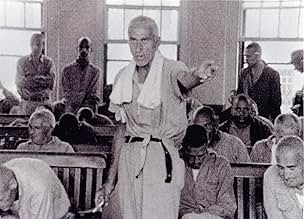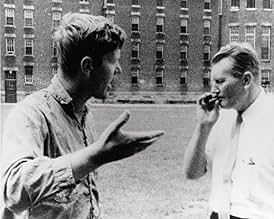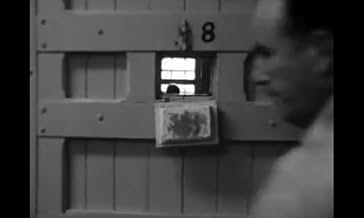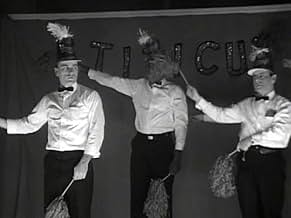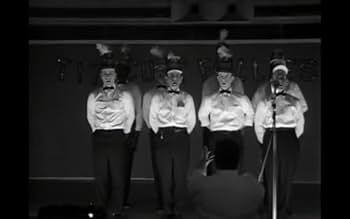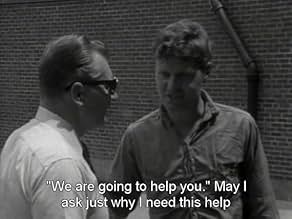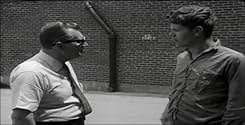Titicut Follies
- 1967
- Tous publics
- 1h 24m
Documentary filmmaker Frederick Wiseman takes us inside the Massachusetts Correctional Institution Bridgewater, where people stay trapped in their madness.Documentary filmmaker Frederick Wiseman takes us inside the Massachusetts Correctional Institution Bridgewater, where people stay trapped in their madness.Documentary filmmaker Frederick Wiseman takes us inside the Massachusetts Correctional Institution Bridgewater, where people stay trapped in their madness.
- Director
- Writer
- Awards
- 6 wins total
Featured reviews
TITICUT FOLLIES is a very shocking film, I would only recommend it with caution to others.
Wiseman is oft said to be of the leading proponents of cinéma verité. His films have no narration, music or titles. He simply observes his subjects with cool, clinical detachment. Whatever Wiseman records, the viewer is left to interpret for themselves. Nothing is explained.
Along with Emile de Antonio, Wiseman is one of the godfathers of documentary cinema. Throughout his career, he'd established the standard for what is now known as "observational" or "objective" documentary film-making. Unfortunately, this tag obfuscates the many symbolic, didactic and "engineered contrasts" found in Wiseman's films. Wiseman's films aren't strictly "objective". They have points to make, and are never free of his subjective biases.
Unlike many documentary filmmakers, Wiseman's films all focus on institutions. His subjects are whole organisations, and he typically generates "drama" by simply observing the various cogs and people at work within these societal machines. High schools, welfare offices, zoos, hospitals, ballet groups, army basic training camps, small towns, ICBM bases and business corporations are just some of the institutions he's tackled.
With "Titicut Follies", Wiseman goes behind the walls of a Massachusetts Mental Institution and exposes the treatment of inmates by guards and social workers. The footage he shoots is both macabre and revolting. The mental institution pretends to be a place of logic and the scientific method, but Wiseman reveals it to be a place of chaos and absurdity. Patients are deemed "mentally unsound" simply for not conforming to the institution's absurd standards. They're routinely teased and bullied, and left to roam the corridors completely naked. One articulate patient attempts to get his doctor to explain why he's being imprisoned, but the doctor has no answer.
Several inmates, one a socialist and the other an intelligent Russian, seem to be in the institution for political reasons. Both are of sound mind, but because they sympathise with the communist cause and distrust American's involvement in Vietnam, they've been labelled paranoid schizophrenics and jailed indefinitely.
The hardest scene to watch is of a forced feeding. A doctor smokes a cigarette as he inserts a long rubber tube into a patient's nostril and pours soup into a funnel. Halfway into the procedure, the doctor's cigarette falls into the funnel. In a surprisingly heavy handed directorial intrusion, Wiseman inter-cuts this painful scene with glimpses of the patient's corpse being prepared for burial.
Frederick Wiseman is a curious case in cinema. You can arguably group modernist "brain" cinema into two categories: left brain artists and right brain artists. Left brain artists (Antonioni, Kubrick, Bresson, Haneke etc) are very rare. They're logical, sequential, rational, analytical, objective and look at things in terms of parts, units or sections.
Right brain artists are more common. They're intuitive, holistic, synthesising, subjective and look at wholes. They like randomness and communities. Altman, John Sayles, Spike Lee, Fassbinder, Wenders, Malle, Fellini and Lynch are good examples.
Wiseman's form is very much like a Stanley Kubrick film. He sees his subjects in terms of sections and parts. In terms of machines and larger constructs. His camera is always distant, detached and objective. One can see echoes of "Full Metal Jacket" in Wiseman's "Basic Training" and "2001" in "Zoo".
But behind this is an artist who seems to embrace improvisation and chaos. Wiseman works fast with a single camera and a simple microphone. He catches what he can, without purpose and plan, sculpting his films entirely in the moment. This lends his films, when viewed together, a strange feel. You get the sense of large social constructs, giant institutions and sprawling communities, machine like in their workings and routines, and yet within these machines, Wiseman captures fleeting glimpses of humanity, spontaneous and wild.
8/10 – This is a nightmarish little film. It's not as great as some of Wiseman's later flicks, but it is perhaps his most influential. To this day it remains the only movie in U.S. history to be banned for reasons other than obscenity or national security. Director Milos Foreman would screen "Titicut Follies" for his crew prior to making "One Flew Over The Cuckoo's Nest" and Paddy Chayevsky would base "The Hospital" on Wiseman's "Hospital". Makes a good companion-piece to Wiseman's "Near Death".
Did you know
- TriviaAlong with Superstar: The Karen Carpenter Story (1987), which is illegal due to copyright issues, this is the only American film banned from release for reasons other than obscenity or national security. 'Titicut Follies' was filmed inside the Massachusetts Correctional Institution at Bridgewater, a prison hospital for the criminally insane. After the Commonwealth of Massachusetts sued the filmmakers, the Massachusetts Supreme Judicial Court ruled that the film constituted an invasion of inmate privacy and ordered the withdrawal of the film from circulation.
- Quotes
Patient: How did the first Great War start? Because of a demand by the Austrian Hungary Dynasty for the execution of an accomplice who already was sentenced to life imprisonment in, um, in Serbia. Yet they demanded a prosecution for execution for Austria-Hungary laws! What does that mean? They wanted execution! The war was fought over execution! The same execution that is going on in Vietnam; over making an execution over these natives of Vietnam. They're not Vietcong, they're not communists. Whatever the American Government doesn't like, they use the - they foist on this term "communist". Because I speak the way I do, you gonna call me a communist? I'm not a communist! Even though, I have communist affiliations. Communist really means Community-ist. That's what we are if you want to call us communists because we are FOR our community. We like the well-standards. We're for the people. And that's what they call these uh... what do they call? these people that talk about a new matter... Agitators! We agitate... do we start these troubles? I'm a communist because I expound my views about the world conditions? It's the duty of every citizen to expound his views or her views of what goes on in the world. If more of them expounded their views about the conditions in the world, less chaotic conditions would exist. And the nuclear war is gonna happen not because - not what i say, not what all these war-mungers or peace-mungers blab about because all throughout the ages you will find: every time a new weapon was put out they say its the end of war. They said the submarine was the end of war, what happened? The gas masks put an end to war. What happened? They got masks. What about these submarines that are supposed to control the seas? What happened? They got airplanes that drop def-charges. You look through the ages and you find new weapon is put out, somebody puts out a counter-weapon. But the nuclear weapon doesn't stop because people are stock-piling. Anybody who starts stock-piling weapons eventually uses them! They get tired of stock-piling them and they use them. They're just like kids. They figure they got toys to play with, they're gonna play with those toys!
- Crazy creditsRe-release: 'The Supreme Judicial Court of Massachusetts has ordered that "A brief explanation shall be included in the film that changes and improvements have taken place at Massachusetts Correctional Institution Bridgewater since 1966".
- ConnectionsFeatured in What Is Cinema? (2013)
- How long is Titicut Follies?Powered by Alexa
Details
- Release date
- Country of origin
- Official site
- Language
- Also known as
- Безумцы Титиката
- Filming locations
- Production company
- See more company credits at IMDbPro
- Runtime1 hour 24 minutes
- Color
- Sound mix
- Aspect ratio
- 1.37 : 1
Contribute to this page


